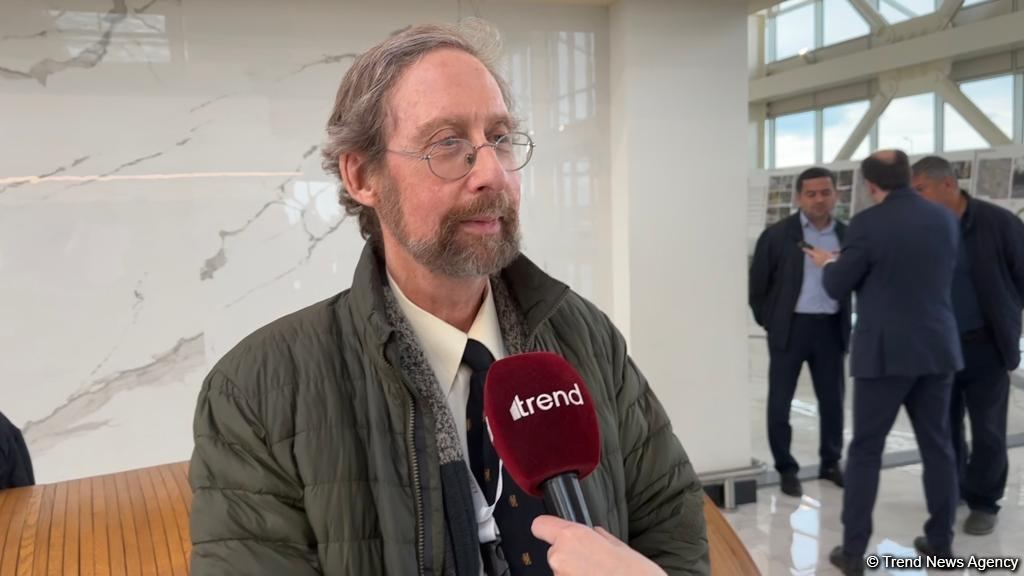BAKU, Azerbaijan, March 20. The EU–Azerbaijan energy cooperation is irreversibly deepening, Robert M. Cutler, energy security and geo-economics specialist, fellow, Canadian Energy Research Institute, fellow, Canadian Global Affairs Institute wrote in his article published on the website of the NATO Association of Canada, Trend reports.
“On 1 March 2024, Baku, Azerbaijan, became the focal point for a pivotal convergence in the energy sector: the 10th Ministerial Meeting of the Southern Gas Corridor (SGC) Advisory Council alongside the 2nd Ministerial Meeting of the Green Energy Advisory Council. The gathering represented a significant milestone in the cooperation of the European Union (EU) with the Republic of Azerbaijan while it also showcased how global energy strategies are dynamically evolving,” reads the article.
The author points out that the Southern Gas Corridor (SGC) is a pivotal pipeline project facilitating the transportation of gas from the Caspian Sea region to Europe. Since the onset of the Ukraine war in February 2022, the SGC has emerged as a vital mechanism in lessening Europe's reliance on Russian gas. Azerbaijan's Shah Deniz gas field, situated offshore, serves as the primary supplier for this corridor, reads the article.
Cutler emphasizes that against the backdrop of evolving geopolitical dynamics and increasing political impetus for energy diversification towards nontraditional sources, the recent meetings underscored Azerbaijan's strategic importance.
”The meeting in Baku underscored Azerbaijan’s pivotal role in enhancing European energy security through diversified gas supplies. However, its significance arises not just from its enormous natural gas deposits but also from its vast potential for wind power,” he added.
The gatherings in Baku convened representatives from 23 partner governments and 52 institutions and companies, as highlighted by the author. These meetings underscored the enduring commitment between the European Union (and the Republic of Azerbaijan to their Strategic Partnership in the energy sector. The presence of EU Commissioner Kadri Simson underscored the significance of the EU-Azerbaijan partnership from Brussels' perspective. This collaboration encompasses various practical policy domains, including ensuring an affordable, stable, and secure natural gas supply, fostering renewable energy generation, improving energy efficiency, exploring hydrogen production, mitigating methane emissions, and ensuring environmental protection.
“For example, the European Commission facilitated a Memorandum of Understanding (MoU) on wind-energy cooperation between Azerbaijan’s Renewable Energy Agency and the European industry association WindEurope. This MoU opens the door for European renewable-energy companies to participate in harnessing Azerbaijan’s vast wind-power potential, likely accelerating the increase of the share of nontraditional energy in the region and potentially supplying it to Europe.
Azerbaijan boasts the potential for 27 gigawatts (GW) of wind and solar power onshore, with an additional 157 GW of wind power in its offshore Caspian Sea sector. Azerbaijan has set the ambitious goal for such sources to constitute 30 percent of its total installed electricity capacity by 2030. This goal contributes to its excellent relations with the EU in view of the latter’s push toward nontraditional energy sources.
Thus the SGC, traditionally associated with natural gas, has evolved into a platform for cooperation that now encompasses renewables and electrification. The strategic partnership on wind energy illustrates the deepening of the cooperation, as nontraditional forms of energy become an equal aspect of their bilateral relations,” he added.
Additionally, Cutler highlighted Azerbaijan's significant stride in joining the Global Methane Pledge initiative, which involves voluntary commitments by nation-states to decrease global methane emissions by at least 30 percent by the decade's end. Azerbaijan's commitment to climate action dates back to its ratification of the UN Framework Convention on Climate Change in 1995 and the Kyoto Protocol in 2000. Notably, Azerbaijan has updated its Nationally Determined Contributions (NDC), aiming for a 40 percent reduction in atmospheric gas emissions, up from the previous 35 percent target. Furthermore, it has announced plans to designate the Karabakh and Eastern Zangezur economic regions as a decarbonization zone with a target set for 2050.
“With the close of the 10th Ministerial Meeting of the Southern Gas Corridor Advisory Council and the 2nd Ministerial Meeting of the Green Energy Advisory Council in Baku, it is clear that EU–Azerbaijan energy cooperation is irreversibly deepening. The two sides converge in their agreed emphasis on ensuring the stability of the supply of natural gas while pursuing ambitiously the development of nontraditional energy resources. This agreement represents a strategic partnership with a shared vision for the future of energy geoeconomics and signifies a robust foundation for advancing shared interests and mitigating threats to energy security,” the author concludes.
Follow the author on X: @Lyaman_Zeyn







